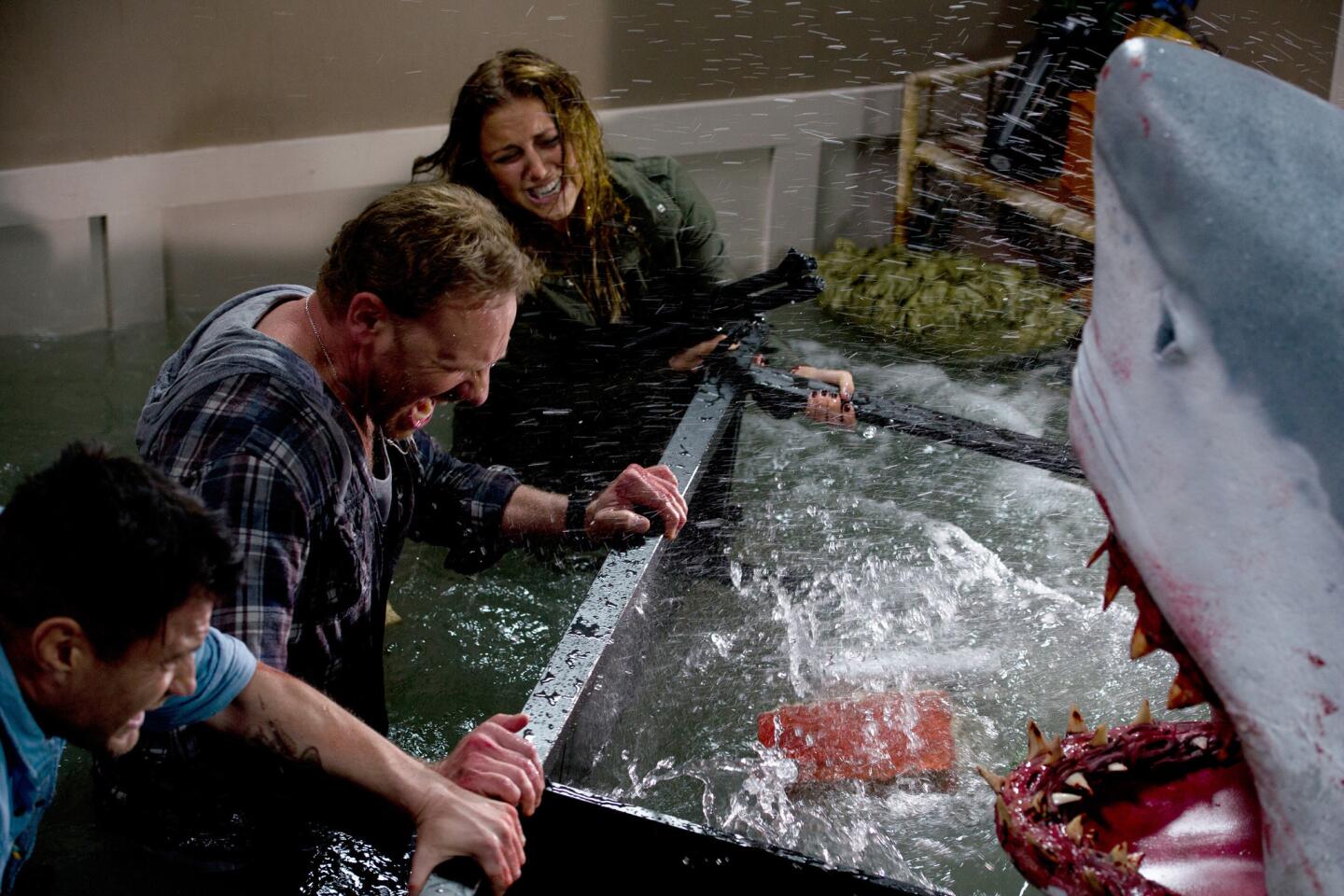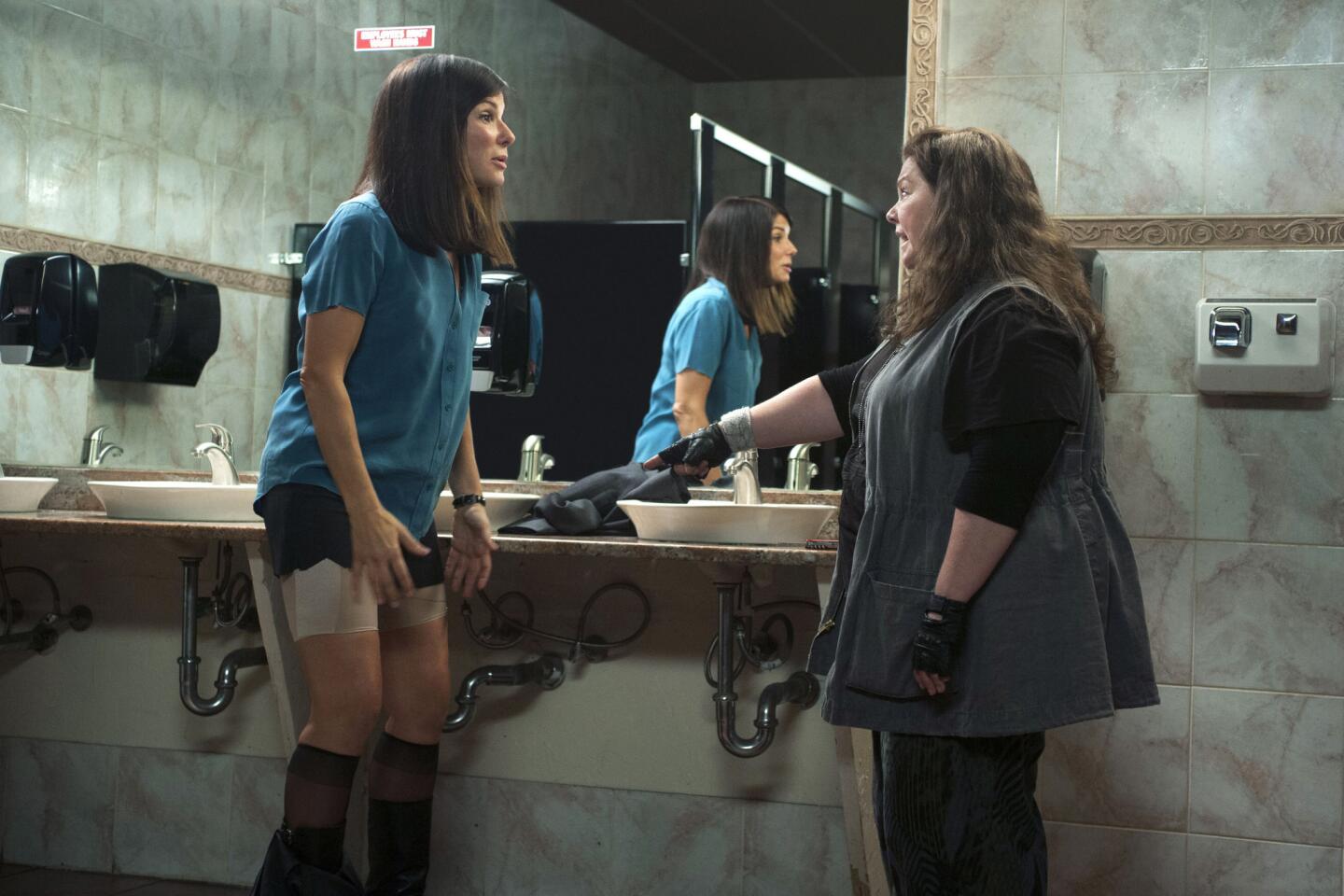Summer B-movies are doing an A-list business
- Share via
Summer moviegoing is usually about the stars, the spectacle and the sizzle.
But in a trend that’s mystifying Hollywood, this summer’s box office is being driven by films with modest ambitions, including relatively inexpensive comedies, lower budget animation and horror pictures.
Call it the summer of the B-movie. Like the quickie flicks the studios used to crank out for the back end of double features, these new hits — “The Heat,” “Grown Ups 2,” “Despicable Me 2” and, as of this weekend, “The Conjuring” among them — are drumming up business, while bigger-budgeted offerings such as “The Lone Ranger” and “Pacific Rim” struggle to sell tickets.
It’s these smaller films that have helped summer box-office receipts climb by 14% over last year--defying the conventional wisdom that summer is the time when audiences mainly want to see movies that are big, loud and laden with costly special effects.
PHOTOS: Hollywood backlot moments
The numbers have Hollywood experts grasping for explanations, including studios doing a better job of serving niche audiences on the one hand and consumers experiencing blockbuster fatigue on the other.
“Everything looked watered down and the studios were left trying to distinguish their movies,” said Ted Mundorff, chief executive of Landmark Theatres, affirming the second theory.
This weekend the trend seems to be hitting its apex. “R.I.P.D.,” a supernatural science fiction comedy starring household names Ryan Reynolds and Jeff Bridges that cost at least $130 million to make, is projected to take in less than $15 million at the box office. Meanwhile, “The Conjuring,” a paranormal-themed film made for the horror faithful at one-seventh the budget, is expected to collect as much as $35 million.
Last weekend “Pacific Rim”— a movie that received generally positive reviews but reminded some people of the “Transformers” franchise — struggled. It cost nearly $200 million but has taken in just $49 million so far.
“Grown Ups 2,” by comparison, cost a relatively modest $80 million and in less than a week has taken in $66 million, virtually assuring a tidy profit. The film didn’t try to build a new mythology or dazzle with effects; instead it was a lighthearted confection with recognizable jokes about bodily functions and child rearing meant to comfort more than shock — a kind of B-movie comedy for the modern age.
“In a way it’s a little bit of a memory piece,” director Dennis Dugan said. “Maybe it’s an alternative to all the big guys blowing stuff up.”
Since the summer moviegoing season began in early May, the biggest-budgeted new movie has now failed to win the weekend box office on eight occasions. In the comparable period in 2012, this happened only three times. Ditto for 2011.
Of course, moviegoers have yet to tire of superheroes — “Iron Man 3” and “Man of Steel” are the summer’s top-grossing movies. And occasionally an expensive star-driven movie, such as Brad Pitt zombie flick “World War Z,” has found an audience. But the summer has had a higher number of high-profile flops. All-audience extravaganzas such as Will Smith’s science-fiction film “After Earth,” Channing Tatum’s D.C. action picture “White House Down” and Johnny Depp’s western comedy “The Lone Ranger” — which cost as much as $225 million and are the closest thing Hollywood has historically had to sure bets — all fizzled in the last month.
PHOTOS: Celebrities by The Times
“There’s a lot of blood in the water,” said Fox distribution president Chris Aronson. “There have been more high-profile failures than normal. But it’s hard to castigate the business when business is up,” offering a contradiction articulated often in recent weeks on studio lots.
One of the lower-budget breakout hits is the animated sequel “Despicable Me 2,” which has taken in nearly $250 million, with a budget about half that of Pixar and DreamWorks animated features. Another is “The Heat,” a cop comedy starring Sandra Bullock and Melissa McCarthy that succeeded precisely by not trying to please everyone; two-thirds of opening-weekend fans were women.
By shrewdly targeting a demographic in the manner of many a vintage B-picture, it has proved far more popular than many of its all-audience counterparts. “The Heat” has taken in $40 million more than “Lone Ranger,” with little hope of the western catching up. (As it did in the heyday of the B-picture, the rise of the smaller movie of course doesn’t necessarily mean an increase in quality; Adam Sandler’s “Grown Ups 2” garnered a Rotten Tomatoes score barely above 0%).
Those behind the smaller movies say it’s no accident their films are catching on. Producer Jason Blum, who saw his $3.5 million-budgeted “The Purge” gross nearly 20 times that, said that he could afford to take more chances with his movie.
“If someone at a studio wants to do something unusual like put billboards over L.A. saying ‘Emergency Services Suspended,’” Blum said, alluding to “The Purge’s” canny outdoor-marketing campaign, “they might, but they’d have to jump through a lot of hoops. With a $3-million movie you can much more easily take a risk.” (Though financed and distributed by Universal, Blum’s movie was made largely free of studio intervention.)
Blum noted that similar sense of financial freedom helped him make satisfying choices within the movie. “I can kill my lead halfway through if the story calls for it. You could never do that with a $100- or $200-million movie.”
Though traditionally B-movies had more self-conscious camp than these new films — think “Plan 9 From Outer Space” — this crop have many of the same hallmarks: familiar plots, escapist intentions, low budgets and high concepts. “The Purge” tells of a world in which all crime is legal for one day — and benefited from a social-media campaign that had users tweeting outrageous things they would do if a purge was real.
Hollywood responds slowly to change. But studios are beginning to react, with studio executives saying they’re thinking about reducing the number of summer films. The sense is that audiences still want to see spectacle this time of year — they just don’t want to see so much of it.
“It feels like it went a notch too far with the number of movies out there over $100 million,” said Rob Moore, vice-chairman of Paramount, who had one of the rare big-budget hits in “World War Z.” “It felt like there was an unlimited capacity for these movies, but this summer challenged that thinking.”
But shifting models isn’t easy. With their gargantuan conglomerate-owned operations, studios, for instance, won’t be able to increase the number of inexpensive genre films to create a modern day version of the B-movie factory.
“I don’t see the studios suddenly getting into the microbudget game in a comprehensive way,” Blum said. “They’re just not built for that.”
More to Read
Only good movies
Get the Indie Focus newsletter, Mark Olsen's weekly guide to the world of cinema.
You may occasionally receive promotional content from the Los Angeles Times.














